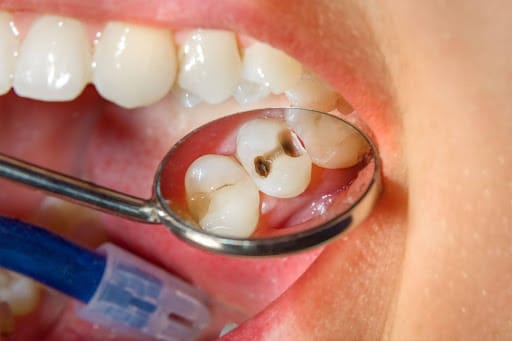
How Do Cavities Form?
Cavities are holes that form on the hard surfaces of your teeth. Here’s a breakdown of the dental decay process in action:
- We all have small bacteria inside our mouths that feed on leftover sugars and starches found on our teeth.
- As these bacteria feed on our leftovers, they produce acids that eat away at the enamel, a tooth’s thin outer covering.
- Eventually, a hole forms in the tooth’s enamel, allowing the bacteria acid to continue eating even deeper into the tooth.
- The deeper the hole gets, the larger a cavity becomes.
Common Causes of Cavities
Now that you understand what you’re up against, the importance of regular brushing and flossing should be a bit clearer. When bacteria are allowed to linger on your teeth for too long, they begin to turn into plaque and tartar.
Plague is a thin layer of bacteria, while tartar is hardened plaque that’s very difficult to remove. But what if brushing and flossing don’t keep persistent cavities away?
Repeat cavities could be due to a variety of different reasons. Some of the most common include:
The Wrong Toothpaste
Some toothpastes contain more fluoride, a cavity-fighting mineral, than others. Others may have a high enough relative dentin abrasion (RDA) value to cause damage to your teeth’s enamel. It’s worth asking your dentist for help selecting the best toothpaste for you.
Sugary Foods and Drinks
Bacteria love feeding on sugars found in candy, desserts, and sodas. Eating high-sugar foods regularly can increase your risk of developing cavities and experiencing recurrences after treatment.
Dry Mouth
Saliva helps prevent cavities by naturally washing excess food from your teeth. It also counteracts bacterial acid. Certain medications that decrease saliva production may be the culprits behind your cavity problem.
Failed Fillings
If fillings are not performed properly, they can easily become damaged and fall out, leaving the tooth vulnerable to more decay. Likewise, intense chewing or teeth grinding can also wear down failings and result in recurring struggles with tooth decay.
Schedule a Consultation With Dr. Siegelman
Looking for a NYC dentist who understands your dental phobia? Louis Siegelman, DDS is dedicated to helping patients like you take the stress out of dentist visits. Reach out any time at (212) 974-8737 or through our online contact form to learn more.

